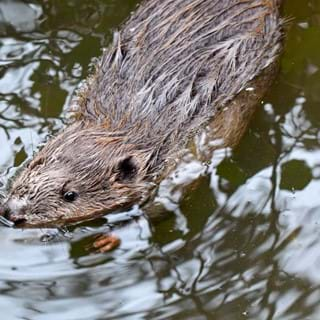
- Home
- About us
- Sanctuary News
- 2022
- Cornish Seal Sanctuary celebrates World Habitat Day with conservation project success
Cornish Seal Sanctuary celebrates World Habitat Day with conservation project success
Monday, 03 October 2022
Two beavers from the Cornish Seal Sanctuary have moved to a new home with the Wildwood Trust, as part of an ongoing conservation project to support beaver populations and rewilding initiatives across Britain.
Scruff and Maple joined the Sanctuary’s Secret Creek nursery back in January as juvenile beavers. Part of a collaborative rehabilitation project with Beaver Trust, who undertake licensed translocations as part of the species’ wider restoration, the charity provided a temporary home for the pair until they were big enough to be relocated to another rewilding programme.
Tamara Cooper, Curator for the Cornish Seal Sanctuary, says: “We’re thrilled to see more success from this project, following the relocation of their sibling, Hamish, from the Sanctuary’s facilities earlier this year after another rewilding opportunity in April.
“Scruff and Maple have grown into two very healthy beavers, who have had as little human interaction as possible to ensure they build those crucial instincts to live in a wild environment.
“Now, our partnership with Beaver Trust and Wildwood Trust has given us the opportunity to help them move to a larger premises and continue to support their journey back to the wild, helping increase beaver populations across Britain.”
The two siblings are currently settling into their new home with the Wildwood Trust, near Canterbury with reports they are already making the most of their new environment.
Paul Whitfield, Director General from the Wildwood Trust, says, “The beavers have settled in really well and we’re looking forward to having them with us until they are ready to be released into the wild. They’re enjoying the deep pool and have already started to fell the willow and birch saplings, displaying the exact behaviours that make them ‘ecosystem engineers’.
"At Wildwood, we’ve been involved in the reintroduction of beavers to Scotland for many years now so we’re delighted to be part of this important collaboration, which will create new wild populations of beavers in England.
“It’s been a double celebration for nature this weekend with their arrival coinciding with the long-awaited change to the law which protects wild-living beavers in England - 400 years after they were hunted to extinction.”
Roisin Campbell-Palmer, from Beaver Trust, the organisation managing the beavers’ translocation says, "Beaver rehabilitation will continue to be necessary as part of the species’ restoration and is made possible through collaborative partnerships such as this.
"With beavers being such an iconic keystone species, we’re pleased with this pair’s transition on World Habitat Day."
The move comes as the Cornish Seal Sanctuary gets ready to celebrate World Habitat Day, marking the importance of beavers within healthy ecosystems.
Beavers are a ‘keystone’ species, which means their natural behaviour has a big impact on our landscape and wildlife. By damming waterways, they pool water, which, in turn, slows the flow in rivers and streams and helps to create new wetland to support a huge diversity of wildlife - providing a home and water source for many other species, too.
Wildlife conservation is at the heart of all the Sanctuary’s ethos, and, with the perfect habitat to care for beavers, it’s been an amazing opportunity to not only help restore this species, but also undertake vital research into their impact on the environment.
As we continue to partner with the likes of Beaver Trust and Natural England, who provided all the necessary licensing, our Sanctuary team looks forward to seeing more success from the Secret Creek project and welcoming other juvenile beavers to our site for rehabilitation.
Did you know you can help, too? To ensure we can continue to provide expert care to our remaining residents and rescued beavers, carry out our ecological projects and introduce an exciting visitors centre, we need the support of the public to keep this vital work going.
To donate to the project, or to find out more, click here.
